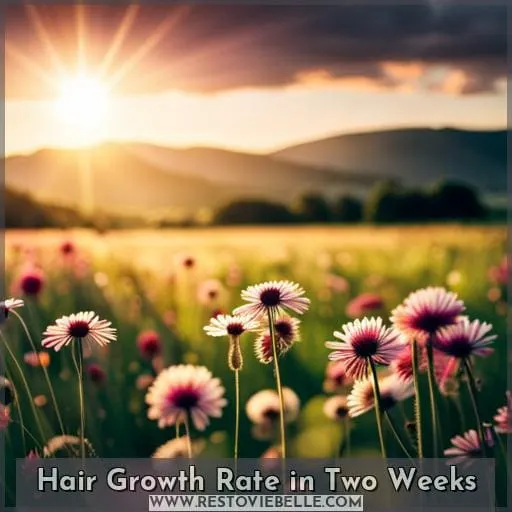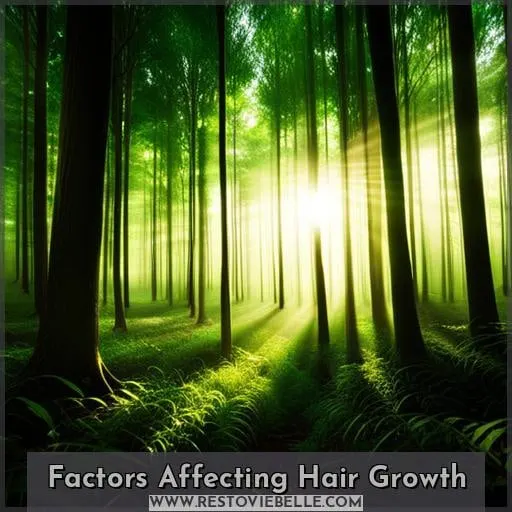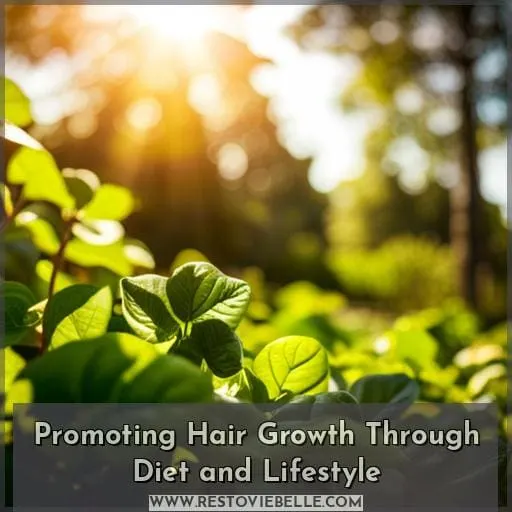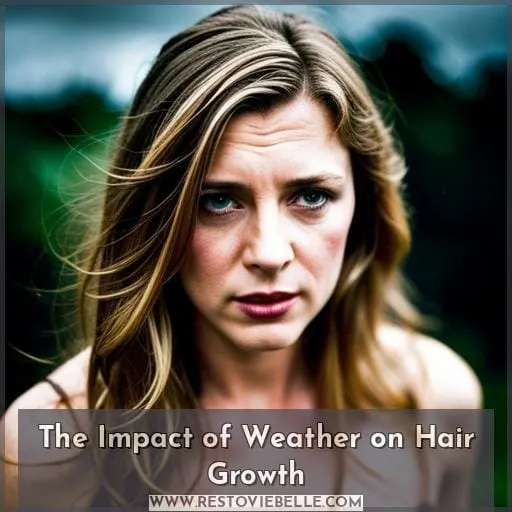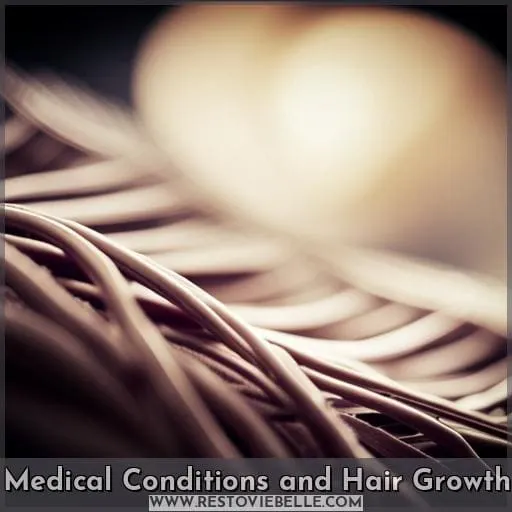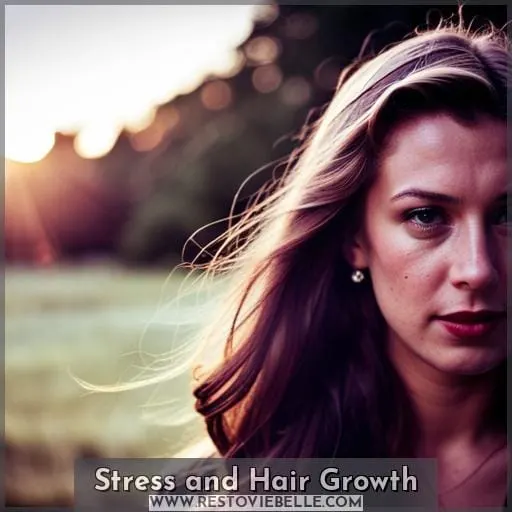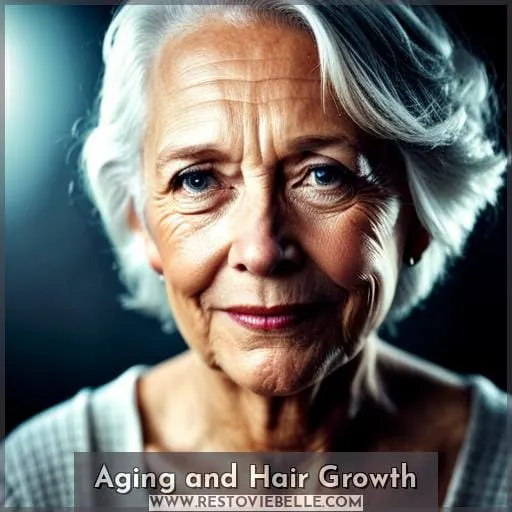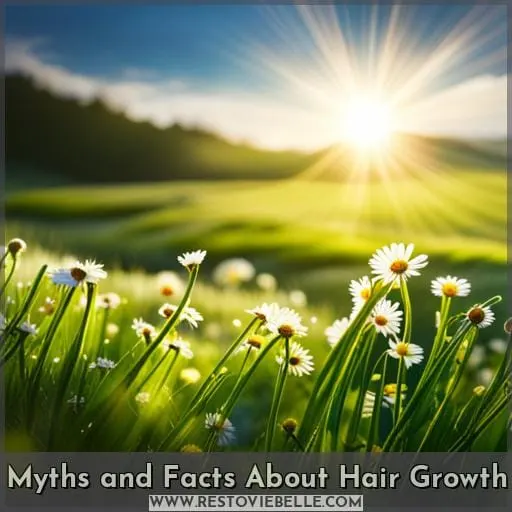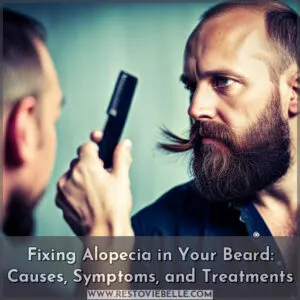This site is supported by our readers. We may earn a commission, at no cost to you, if you purchase through links.
 Curious about how much your hair can grow in just two weeks? You might be surprised to learn that the average rate of hair growth is about half an inch per month. But there are many factors that can affect this, including genetics, hormones, nutrition, and stress levels.
Curious about how much your hair can grow in just two weeks? You might be surprised to learn that the average rate of hair growth is about half an inch per month. But there are many factors that can affect this, including genetics, hormones, nutrition, and stress levels.
In this article, we’ll explore these factors and debunk some common myths surrounding hair growth.
Table Of Contents
- Key Takeaways
- Hair Growth Rate in Two Weeks
- Factors Affecting Hair Growth
- Promoting Hair Growth Through Diet and Lifestyle
- Essential Oils and Carrier Oils for Hair Growth
- The Role of Vitamins and Nutrients in Hair Growth
- The Impact of Weather on Hair Growth
- Medical Conditions and Hair Growth
- Stress and Hair Growth
- Aging and Hair Growth
- Myths and Facts About Hair Growth
- Frequently Asked Questions (FAQs)
- Can hair growth be accelerated in just two weeks?
- What are some natural remedies to promote hair growth in a short period of time?
- Are there any specific vitamins or nutrients that can enhance hair growth within two weeks?
- How does stress affect hair growth in such a short timeframe?
- Is it possible for hair growth to be affected by weather conditions within a two-week period?
- Conclusion
Key Takeaways
- Genetics play a role in hair growth rate.
- Age can influence the speed of hair growth.
- Stress levels impact the hair growth cycle.
- Weather conditions may affect hair fragility.
Hair Growth Rate in Two Weeks
In just two weeks, your hair can grow approximately 4.2 to 5.6 mm, depending on various factors such as genetics, age, and overall health.
Hair growth is a complex process influenced by several internal and external factors that determine the rate at which our hair grows.
- Genetics play a significant role in determining how fast or slow our hair grows. Some individuals have naturally faster-growing hair due to their genetic makeup.
- Age also affects the speed of hair growth, with younger individuals experiencing faster growth compared to older adults.
- Nutrition has a direct impact on the health of our hair and its ability to grow quickly. A well-balanced diet rich in vitamins (especially vitamin D), minerals like iron and zinc, protein sources such as lean meats or legumes helps promote healthy follicles for optimal growth.
- Stress levels can affect not only our mental well-being but also influence the rate at which our body produces new cells – including those responsible for growing new hairs from follicles beneath your scalp’s surface layer called dermis; thus encouraging stress management techniques could support healthier strands!
- Weather conditions may indirectly impact how fast your locks grow too – extreme temperatures might lead them becoming more fragile than usual due changes within moisture content held by each strand itself resulting breakage rather than allowing length gains over time if overlooked entirely during seasonal transitions throughout year-round lifestyle maintenance routines applied towards daily grooming habits alongside hairstyling preferences
- Aging is another factor that can affect the rate of hair growth over time since it slows down natural processes within your body—including cell regeneration—which ultimately impacts how rapidly you produce new strands from roots anchored into skin layers above mentioned earlier epidermal structures contribute directly influencing individual’s unique head fullness appearance based upon personal circumstances surrounding one’s own self-care practices maintained regularly while navigating through life stages together forming complete overall image projection outwardly presentable fashion sense mannerisms communicated non-verbally expressing oneself without need verbalizing thoughts ideas emotions something worth considering when discussing desired hair quality quantity questions asked by those seeking answers regarding these matters.
In conclusion, while the average rate of hair growth in two weeks is approximately 4.2 to 5.6 mm, it’s important to remember that individual factors such as genetics, age, nutrition impact stress levels and weather conditions can all influence how fast or slow your hair grows during this time period.
Factors Affecting Hair Growth
Genetics, hormones, nutrition, stress levels, and illness are all factors that can affect hair growth.
Your genetic makeup plays a crucial role in determining your hair growth rate.
Hormonal balance is essential for healthy hair growth, as fluctuations can impact the speed at which your hair grows.
Additionally, maintaining proper nutrition and managing stress levels are also important factors in promoting optimal hair growth.
Genetics
Now let’s delve into the role of genetics in determining hair growth, as it plays a significant part in how much hair grows in two weeks. Genetic factors such as inherited hair traits and genes influence the rate of hair growth and length.
Understanding these genetic influences can help debunk myths surrounding factors that affect our hair growth journey.
Hormones
As we delve into the topic of hormones and their impact on hair growth, it’s important to understand how these chemical messengers play a crucial role in determining the rate at which your hair grows.
Hormonal balance is essential for healthy hair growth.
Testosterone levels influence beard growth.
Nutrition plays a significant role in maintaining optimal hormone levels for overall hair health.
Nutrition
To support healthy hair growth, prioritize a well-balanced diet with essential nutrients and vitamins.
Here are some dietary tips to consider for optimal hair growth:
| Nutrient Deficiencies | Dietary Tips |
|---|---|
| Iron | Consume lean meats, beans, leafy greens |
| Biotin | Incorporate eggs, nuts, seeds into your diet |
Ensure you’re getting enough protein from sources like fish and poultry. Include fruits and vegetables rich in antioxidants to promote overall scalp health.
Stress and Illness
If you’re experiencing stress or dealing with illness, it can have a significant impact on the growth of your hair.
Factors that affect hair growth in these situations include:
- Stress management: High levels of stress can disrupt the normal hair growth cycle and lead to excessive shedding.
- Illness impact: Certain medical conditions, such as autoimmune disorders, can cause hair loss.
- Coping strategies: Implementing effective stress management techniques like meditation and exercise may help maintain healthy hair.
- Aging effects on hair: As we age, our hormone levels change and our bodies become more susceptible to illnesses that can affect overall health and subsequently impact the condition of our scalp and strands.
Taking care of your mental well-being is crucial for maintaining optimal hair health during stressful times or while managing an illness.
Promoting Hair Growth Through Diet and Lifestyle
To promote healthy hair growth, you can make changes to your diet and lifestyle.
A nutritious and balanced diet is essential for maintaining strong and vibrant hair. Ensure that you’re getting an adequate intake of key nutrients such as protein, vitamins (particularly biotin and vitamin D), minerals like iron and zinc, as well as omega-3 fatty acids.
Incorporating foods rich in these nutrients into your daily meals can support optimal hair growth.
In addition to a healthy diet, certain lifestyle habits can also contribute to promoting hair growth. Managing stress levels is crucial since chronic stress has been linked to increased shedding of hair follicles.
Engage in activities like exercise or relaxation techniques such as meditation or deep breathing exercises.
It’s important not to fall victim to common myths surrounding the topic of promoting faster hair growth through various products or treatments alone without addressing underlying dietary factors or overall health maintenance practices properly.
Remember that individual results may vary depending on age, genetics, hormonal balance,and other unique factors,but adopting a healthy diet along with proper stress management strategies will provide the foundation needed for supporting optimalhairgrowth over time.
It’s always bestto consult witha healthcare professional ifyou have anyconcerns aboutyour specific dietary needsor supplementsbefore makingany significantchanges toyour currentroutine.
Focusing on holisticapproachesand understandingthe roleof nutrition,lifestylehabits,andstressmanagementarekeysteps towardpromotinghealthyhairgrowth
Essential Oils and Carrier Oils for Hair Growth
Using essential oils and carrier oils is an effective way to promote hair growth.
Essential oils have numerous benefits for the health of your hair follicles, while carrier oils provide nourishment and moisture to the scalp. When combined, they create a powerful blend that can improve hair density and stimulate growth.
There are several essential oil options that you can use for promoting hair growth. Some popular choices include lavender oil, rosemary oil, peppermint oil, and cedarwood oil. These essential oils have properties that increase blood circulation in the scalp, strengthen hair follicles, reduce inflammation on the scalp which helps prevent dandruff or dryness – all leading to improved beard growth.
Carrier oils act as a base for diluting essential oils and help deliver their nutrients deep into the skin’s layers where it’s needed most by providing moisture without clogging pores or leaving any greasy residue behind when used correctly with only small amounts required per application; some common examples include coconut oil , argan avocado ,and jojoba.
To maximize their effectiveness in promoting beard growth:
- Practice Scalp Massage Techniques: Gently massage your scalp with diluted essential or carrier ols using circular motions stimulates blood flow.
- Try DIY Hair Masks: Create homemade masks by mixing a few drops of desired essential oiI(s), such as rosemary or lavender mixed with appropriate amount of chosen carrrier oi( s). Apply this mixture onto your facial area leave it sit between 15 minutes up until overnight before rinsing thoroughly followed by regular cleansing routine.
- Consider Aromatherapy for Hair Growth: Incorporate aromatherapy practices into daily grooming routines like applying diluted mixtures directly onto chin hairs after washing face each morning OR diffusing these same combinations near where you sleep at night time hours- both methods proven effective according research studies.
Incorporating these techniques won’t only promote hair growth but also provide a relaxing and rejuvenating experience for your scalp.
The Role of Vitamins and Nutrients in Hair Growth
Now let’s delve into the role that vitamins and nutrients play in promoting healthy hair growth.
When it comes to maintaining a luscious mane, your diet plays a crucial role. Here are some of the key benefits of vitamins and nutrients for hair growth:
- Vitamin A: This vitamin helps produce sebum, which keeps your scalp moisturized and promotes healthy hair follicles.
- Vitamin C: Known for its antioxidant properties, vitamin C supports collagen production, which is essential for strong and resilient hair.
- B Vitamins: Biotin (B7), niacin (B3), and pantothenic acid (B5) all contribute to nourishing the scalp by improving blood circulation and supporting cell metabolism.
- Protein & Keratin: Hair is primarily composed of protein called keratin. Consuming adequate amounts of protein ensures proper development of new strands.
While these vitamins provide significant benefits for overall health, it’s important not to fall prey to common myths surrounding their impact on rapid hair growth. While they can support optimal conditions for healthy tresses, there’s no magic pill or quick fix solution that will instantly transform your locks overnight.
To achieve noticeable improvements in your hair’s health through nutritional support:
- Consume a well-rounded diet rich in fruits, vegetables,
- Include lean sources of protein such as chicken breast or tofu
- Stay hydrated with plenty water intake
- Consider consulting with healthcare professionals about dietary supplements if needed
The Impact of Weather on Hair Growth
When it comes to hair growth, the impact of weather can play a significant role in determining how quickly your hair grows.
Weather effects such as seasonal changes, humidity levels, temperature influences, and climate variations all have an impact on the growth of your hair.
Seasonal changes can affect the rate at which your hair grows. During colder months, blood circulation to the scalp may decrease due to vasoconstriction caused by low temperatures. This reduced blood flow can potentially slow down hair growth. On the other hand, warmer seasons with increased sun exposure may stimulate blood circulation and promote faster hair growth.
Humidity also plays a role in influencing how quickly your locks grow. High humidity levels create moisture in the air that can lead to frizz and damage on vulnerable strands of hair, slowing down overall growth rates.
Temperature fluctuations from hot showers or excessive heat styling tools like curling irons or straighteners could weaken protective layers around individual hairs leading them more prone for breakage over time if not properly maintained through healthy care routines.
It’s important to note that while weather impacts do have some effect on our tresses’ development process; ultimately genetics remain one key factor dictating final outcomes – meaning those blessed with good genes will likely see better results regardless their environment!
Medical Conditions and Hair Growth
If you have certain medical conditions, they can affect the growth of your hair. Here are three key factors to consider when it comes to medical conditions and hair growth:
- Hair Loss: Medical conditions such as alopecia can cause significant hair loss. Alopecia is a condition that leads to patchy or complete baldness on the scalp or other parts of the body. It occurs due to an autoimmune response where the immune system mistakenly attacks healthy hair follicles.
- Beard Growth: Similar to scalp hair, some medical conditions can also impact beard growth. For example, alopecia barbae specifically affects facial hair by causing patches of thinning or complete absence of beard growth.
- Medical Treatments: Certain medications used for treating various health issues may also lead to temporary or permanent changes in your hair’s appearance and texture.
Some chemotherapy drugs used in cancer treatment often result in total baldness while others may only cause thinning. Furthermore, hormonal treatments like hormone replacement therapy (HRT) can potentially influence patterns and rates of both scalp and facial hair growth.
In addition, some prescription medications might trigger telogen effluvium which causes sudden excessive shedding lasting for several months before returning back into its normal state after recovery from illness.
When dealing with these medical conditions, it’s important not just focus solely on external solutions but instead take a comprehensive approach including dietary adjustments, lifestyle modifications, and seeking appropriate professional advice.
Such integrated approach will provide best possible results towards achieving optimal hair growth.
Stress and Hair Growth
To understand the impact of stress on hair growth, it’s important to recognize that high levels of stress can negatively affect the health and growth of your hair. Stress management plays a crucial role in maintaining healthy hair. Excessive stress can disrupt the normal cycle of hair growth and lead to increased shedding or slower regrowth.
Hair growth myths often suggest that stress alone can cause permanent baldness, but this isn’t entirely true. While acute episodes of extreme stress may trigger temporary shedding known as telogen effluvium, which typically resolves within six months after reducing or managing the source of stress, chronic long-term exposure to high levels of psychological or emotional distress may contribute to persistent thinning over time.
Stress also indirectly affects your ability to maintain proper nutrition for healthy hair growth. During stressful periods, you may neglect balanced meals and opt for unhealthy food choices instead. This lackluster diet lacking essential vitamins and minerals necessary for optimal follicle function ultimately impacts both scalp health and overall strand strength.
In addition to focusing on effective strategies for managing daily stresses such as exercise routines or relaxation techniques like meditation, incorporating nutritional influences into one’s lifestyle becomes vital in promoting healthier strands from root till tip.
While there are no quick fixes when it comes down getting fuller facial coverage with a beard – patience remains key – here’s what you need know about how age factors into beard development.
Aging and Hair Growth
As you age, your hair growth may slow down due to various factors.
Aging affects the hair growth cycle and can lead to thinner, slower-growing hair.
One of the main reasons for this is a decline in hormone production as we get older.
Hormones such as estrogen and testosterone play a crucial role in stimulating hair follicles and promoting healthy growth.
Another factor that contributes to age-related changes in hair growth is nutrition impact.
As we age, our bodies may have difficulty absorbing essential nutrients needed for optimal hair health, such as vitamins A, B complex, C, D, iron,and biotin.
This deficiency can result in weakened follicles and slower regrowth.
The weather’s role also plays a part; environmental conditions like extreme heat or cold can damage the scalp and inhibit proper blood flow to the follicles,hence slowing down their activity.
Furthermore,stress levels affect overall well-being , includinghairgrowth.Stress triggers hormonal imbalances which disrupts normal functioning ofthehaircycleleadingtothinningandslowerregrowth
While aging does impact your natural rate of hai rgrowth,youcancombattheseeffects by adopting certain strategies.
Suchstrategies include maintaininga balanced diet richinprotein,vitamins,mineralsandalso following an appropriateredlighttherapy.
Theuseofred light therapy has been shown totimulatehairsfollicleactivityandrejuvenateexisting hairs.
In addition,it’simportanttodevelopagoodhair-careroutineandpay attentio ntoyourscalphealth.
Takingcareofyourselfbothinternallyandex-ternallywillhelpmaintainhealthy,hair-growthwellintooldage.
Myths and Facts About Hair Growth
As we age, our hair growth tends to slow down due to various factors such as hormonal changes and reduced blood flow to the scalp. However, it’s important not to fall into the trap of believing common myths about hair growth.
Let’s debunk some of these myths and uncover the facts about promoting healthy hair growth.
Myths and Facts About Hair Growth:
- Myth: Cutting your hair frequently makes it grow faster.
- Fact: While regular trims can help prevent split ends and breakage, they don’t affect the rate at which your hair grows from the roots.
- Fact: Properly cleansing your scalp with a gentle shampoo doesn’t cause increased hair loss. In fact, keeping your scalp clean promotes a healthy environment for new hairs to grow.
- Fact: While certain essential oils like lavender or rosemary may have nourishing properties for the scalp, there’s no scientific evidence that proves their direct impact on stimulating significant hair regrowth.
- Fact; Scalp biopsies are invasive procedures typically used as a last resort when other diagnostic methods fail. They’re rarely needed in routine cases of slower-than-average hair growth.
Frequently Asked Questions (FAQs)
Can hair growth be accelerated in just two weeks?
Hair growth can’t be significantly accelerated in just two weeks.
On average, hair grows about 3 to 4 mm per day, resulting in approximately
What are some natural remedies to promote hair growth in a short period of time?
Boost hair growth naturally in a short time by:
- Massaging the scalp with argan, coconut, almond, or olive oil to stimulate follicles.
- Creating a homemade mask using egg yolk and honey for softness.
- Proper nutrition and hydration are key for optimal results.
Are there any specific vitamins or nutrients that can enhance hair growth within two weeks?
To enhance hair growth within two weeks, incorporate vitamins and nutrients like biotin, vitamin A, and vitamin E into your diet. These essential nutrients act as catalysts for healthy hair follicles, promoting faster growth and thicker strands.
How does stress affect hair growth in such a short timeframe?
Stress can have a significant impact on hair growth, even within a short timeframe.
Elevated stress levels disrupt the hair growth cycle and may lead to:
- Excessive shedding
- Slower regrowth
Managing stress is crucial for maintaining healthy hair growth.
Is it possible for hair growth to be affected by weather conditions within a two-week period?
Hair growth isn’t directly affected by weather conditions within a two-week period. Factors like genetics, hormones, and nutrition have more significant impacts on hair growth. Weather primarily affects the condition and manageability of existing hair strands.
Conclusion
To sum it up, in just two weeks, your hair can grow about half an inch on average.
- Genetics
- Hormones
- Nutrition
- Stress levels
- Medical conditions
To promote healthy hair growth, it’s important to focus on a balanced diet, proper hair care, and stress management. Additionally, incorporating essential oils, vitamins, and nutrients can also support hair growth.
By understanding these factors and debunking common myths, you can take better care of your hair and support its growth.

